Women and China: The China Project Forum
A summary of highlights from The China Project’s inaugural conference.
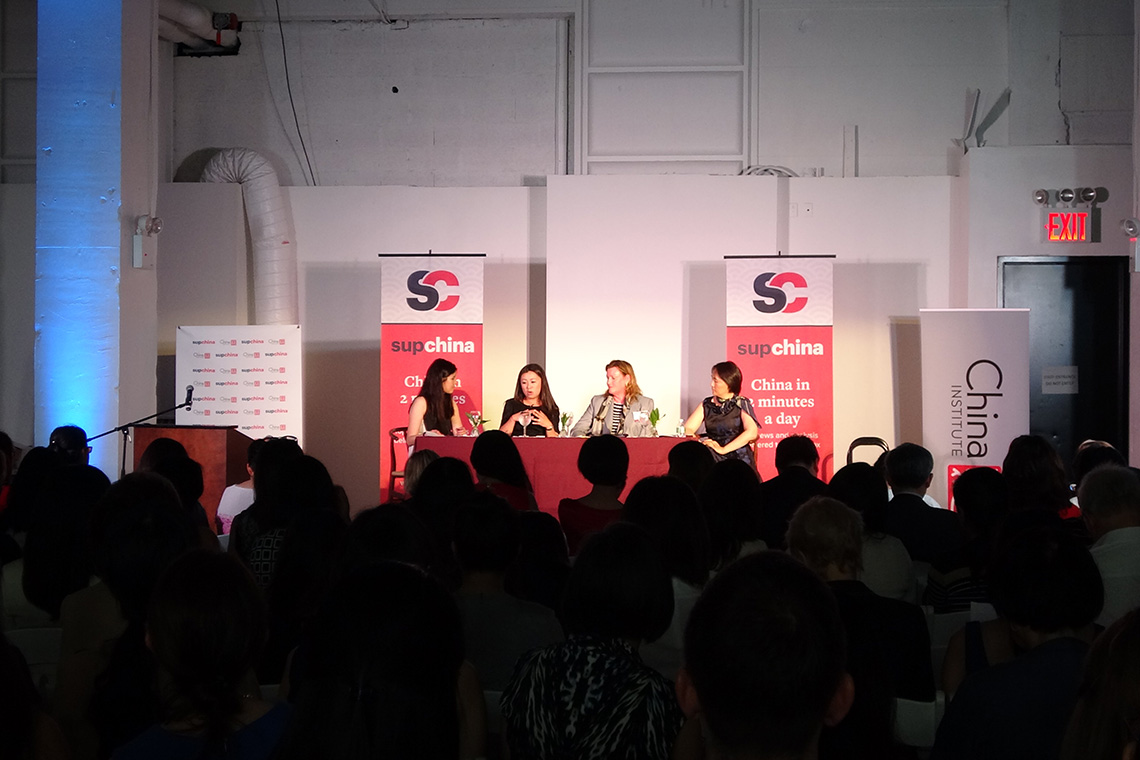
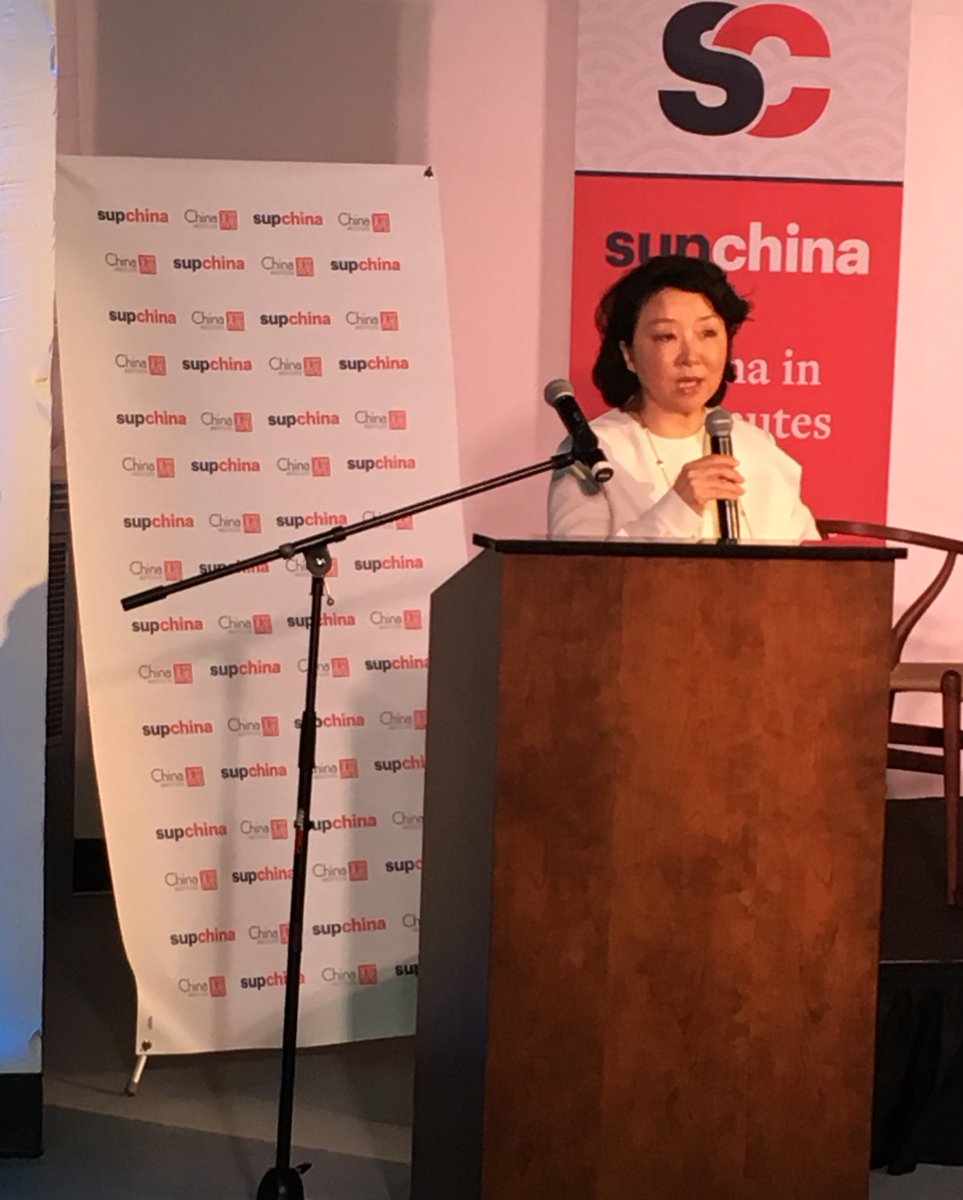
Women and China: A Forum on How Women Are Shaping the Rising Global Power was the first annual conference organized by The China Project — in New York, on May 18, 2017 — to bring outstanding women who work in China-related finance, business, culture, and politics to the stage to talk about their experiences.
Four panel discussions focused on finance, technology and media, business leadership, and TV and film culture with speakers who gave insight into not just their area of expertise, but also the opportunities and advantages of being a woman in their fields and in China.
The China Project founder and CEO Anla Cheng kicked off the event and explained the need for such a conference: The China business and policy world, especially when it comes to speakers in public forums, is dominated by men, but there are innumerable remarkable women whose voices need to be heard. This conference was dedicated to providing a platform for those voices.
Below is a summary of the discussions, and you can also watch a short video of highlights from the event.
Female leaders in finance
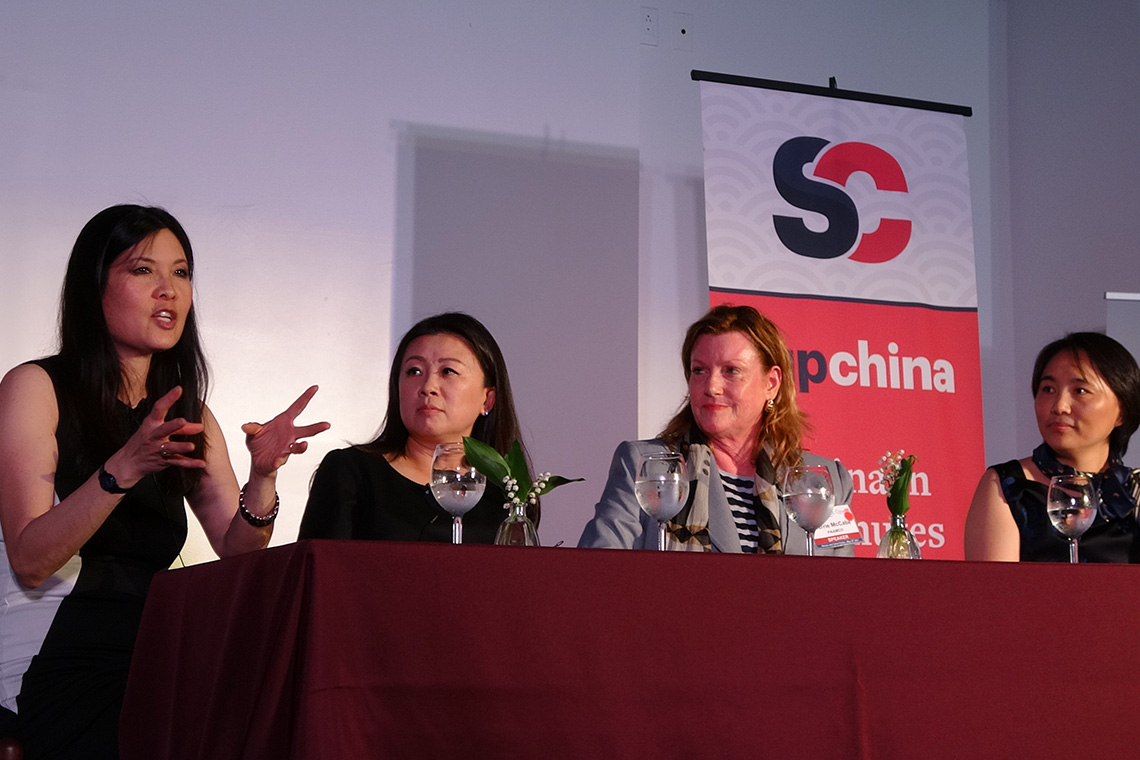
Speakers from left to right
Sheryl WuDunn (moderator)
Pulitzer Prize–winning author, ex-Goldman Sachs executive
Wendy Cai Lee
Founder, CEO – Oenus Capital
Carrie McCabe
Managing Director – PAAMCO
Lanlan Zhang
Vice Chairman – CICC US Securities
The first of the four all-female panels examined investment in China and between China and the U.S. A few highlights of their discussion included:
- Zhang said that for all the anxiety over the new American administration, there is too much at stake between the U.S. and China — “nobody wants to screw that up.”
- Zhang and Cai both noted how common it is to underestimate the cost of doing business in China. People “always assume that what happened in the U.S. is likely to happen in China,” but China is very different, Zhang explained.
- Cai stated that capital controls are “pretty meaningful and real,” though we don’t know how long they will last.
- McCabe said that “the market is so inefficient, and there’s so much to do.” PAAMCO considers around 3,000 to 5,000 stocks on the Chinese exchanges tradable. Zhang added that the development of the market is exciting to investors, who are very positive about China as Chinese companies become more mature and competitive.
- WuDunn, who moderated the panel, asked why Didi Chuxing achieved such success in China that it pushed out its rival, Uber. Zhang answered that starting the app with just taxi drivers was a key move. Still, it is a classic case of a Chinese company excelling at essentially a copy of a Western company’s model; “China may copycat, but it’s a master at it,” WuDunn noted.
Finally, WuDunn asked a question to all panelists, and received fascinating and varied responses:
Q: Where are the greatest opportunities in China? Consumer stocks —McCabe; Healthcare —Zhang; Biotech, clean tech —Cai. #SupChinaWomen
— The China Project (@supchinanews) May 18, 2017
Female leaders in technology and media
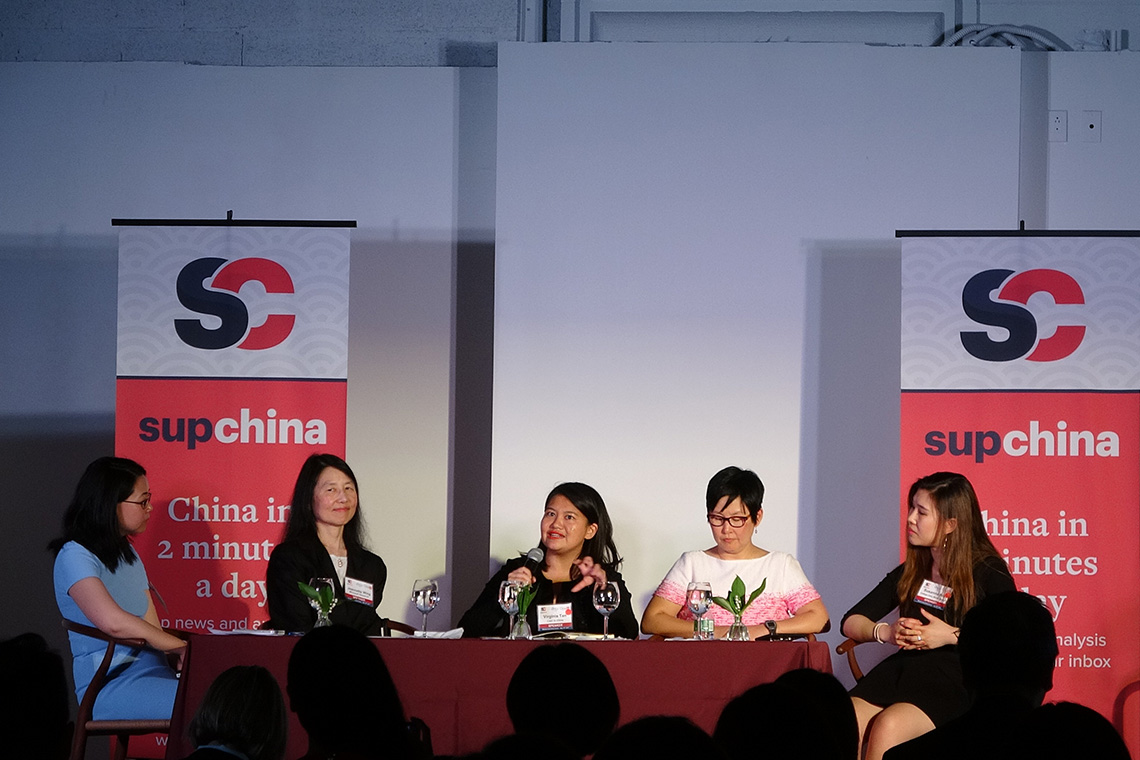
Speakers from left to right
Rebecca Liao (moderator)
VP of Business Development and Strategy – Skuchain
Jeannette M. Wing
Corporate Vice President – Microsoft Research
Virginia Tan
President – Lean In China
Anne Myong
CFO – Walmart eCommerce
Susanna Niu
Partner – College Daily Media Group
A few highlights from the second panel included:
- Wing commented that “the A.I. talent war out there is crazy.” Not enough American students have expertise in the field, so China is well-positioned to compete. Myong added that government funding in China for tech, including A.I., is “like nothing we’ve ever seen” in the U.S.
- Tan said she is “extremely bullish” on Chinese tech as she sees it grow firsthand: An aspirational feeling, not just government funding, drives innovation.
- Myong said that women in Chinese tech are “in some ways, more respected” in China than in the U.S. She later added that China is “one of the most hospitable places in Asia” for businesswomen.
- Tan advised that businesses hoping to compete in the Chinese market need to be “deeply ingrained” in the local environment. Things change too fast, and laws and regulations are subject to change, so understanding on-the-ground conditions and becoming comfortable with “gray areas” is essential.
- Liao, who moderated the panel, asked the speakers how Chinese women might “lean in” and achieve business success. Niu said women should play to their strengths and find good business partners, but just two or three partners is preferable at first. Myong reminded the audience that a business partner need not be your best friend as long as they are someone you trust and respect. Tan said to not worry if you don’t have a background in technology, engineering, or data; technology is just a means to improve people’s lives, and women can, of course, do that. Wing urged any women with a tech background to just “go for it.”
Female leaders in business
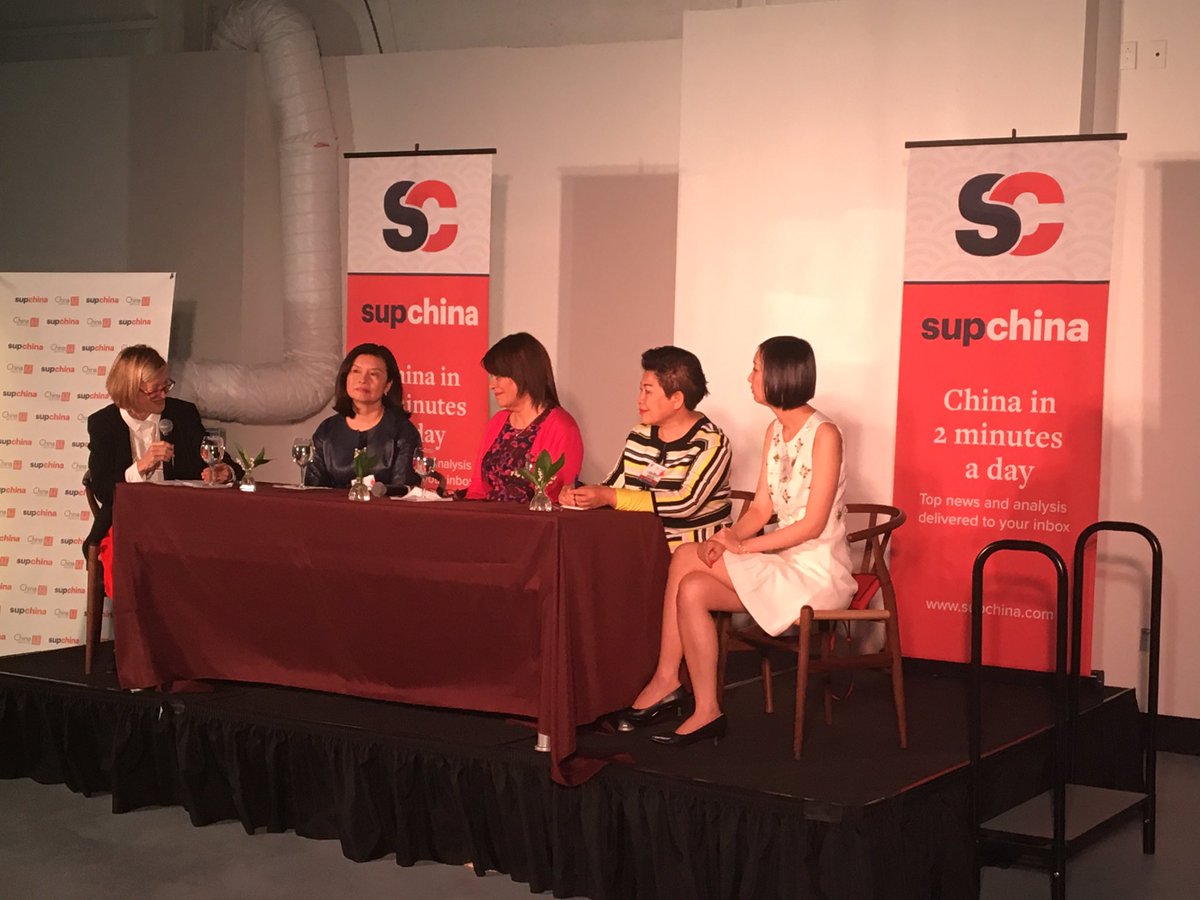
Speakers from left to right
Dorinda Elliott (moderator)
Editorial and Communications Director – Paulson Institute
Jenny Ming
CEO – Charlotte Russe
Virginia Kamsky
CEO – Kamsky Associates
Linda Wong (with translator on far right)
President – Yihai Group
A few highlights from the third panel included:
- Wong explained that even though Yihai Group was very successful in real estate in China, it was tough to adjust to laws and culture in the U.S. The heavily Chinese community in Flushing, Queens, proved more accessible than the middle of Manhattan, in New York.
- Elliott, who moderated the panel, asked what advantages and disadvantages there are to being a woman in business. All panelists agreed that being a woman was advantageous. Ming said that women are more collaborative, and better with teamwork and motivating themselves and others, than men. Kamsky noted that women in China are especially supportive of each other, more than in the U.S. and far more than in Japan. Wong said that women “just look fabulous” and have a “sixth sense,” a nose for good deals and common sense.
- Kamsky observed that in the eyes of many Chinese, when he became president, let the Trans-Pacific Partnership die, and reversed his position on Taiwan, Trump went from “madman” to “businessman.” Wong added that from her perspective, Trump is a businessman in search of profit, and will look to make deals with China on Belt and Road and trade.
- Ming said that ecommerce in addition to a physical store is ideal, but ecommerce is “the best way to test the market.”
Learn more about panelist Ginny Kamsky, a legend in the U.S.-China business world, on a recent episode of the Sinica Podcast.
Female leaders in culture
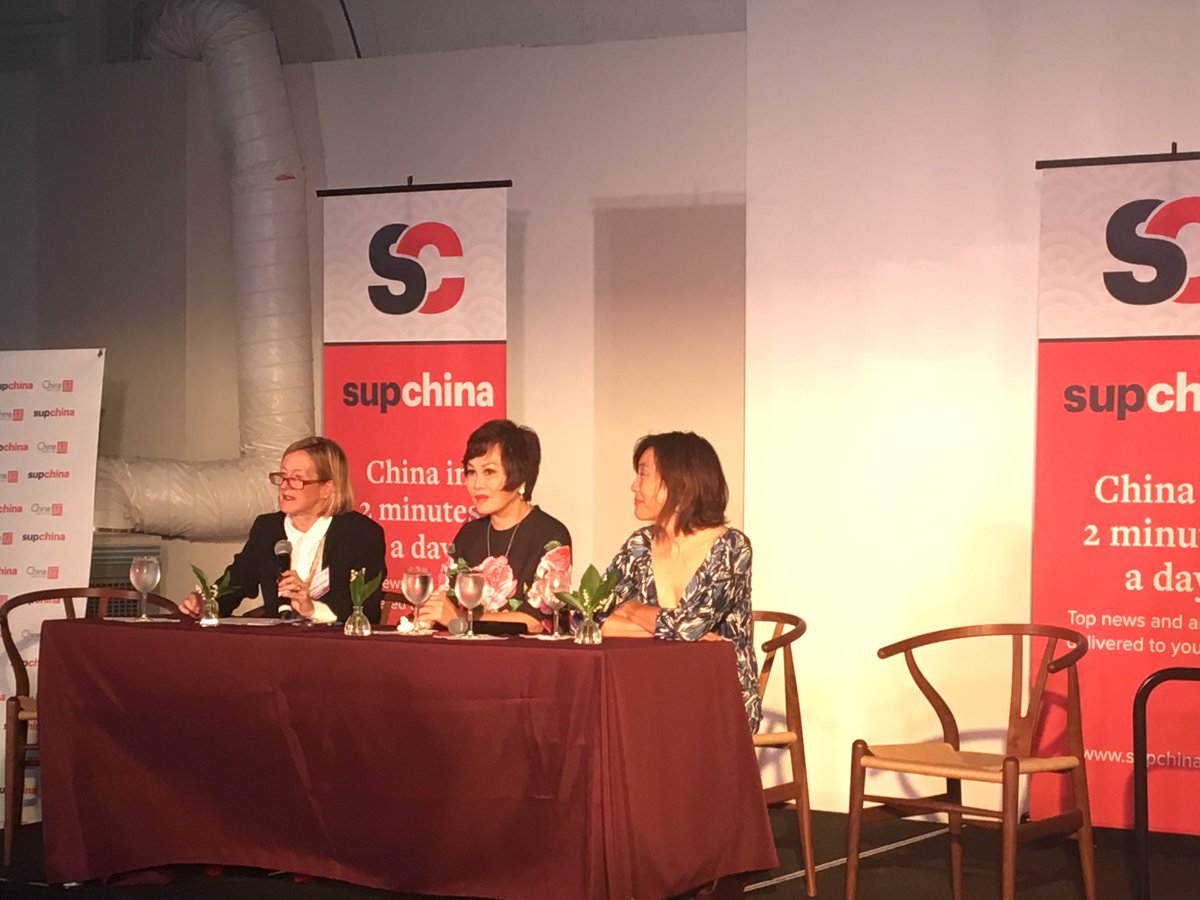
Speakers from left to right
Dorinda Elliott (moderator)
Editorial and Communications Director – Paulson Institute
Yue Sai Kan
Entrepreneur and TV host
Janet Yang
Movie producer – The Joy Luck Club
A few highlights from the fourth panel included:
- Yang recounted how when she first had the opportunity to make a movie in China, she had no idea China would become one of the world’s largest film markets. But she took the opportunity, and urged others to “seize the moment.” Elliot, who moderated the panel, added that you should “follow your nose and follow your heart…and walk through that door if the door is open.”
- Kan recounted how when cosmetics — a Western import at first — arrived in the Chinese market, Chinese people were split on how to react, but she gave them a message that such products could be empowering.
- Kan noted that Korea sent out students around the world decades ago to study film, so it is no surprise that Korea is making better TV dramas compared with China’s now.
- Yang said that after Crouching Tiger, Hidden Dragon (2000), movies in China boomed. They ranged from pure propaganda to art to what is now best described as “unbelievable commerciality.” Chinese blockbusters, she explained, are “so specific to the tastes of the Chinese market” that they don’t get much attention overseas. She later added that the commercialism in the current market is just one of many cycles — there’s a “lot of naivete” in the current focus on moneymaking that will be outgrown, she said.





